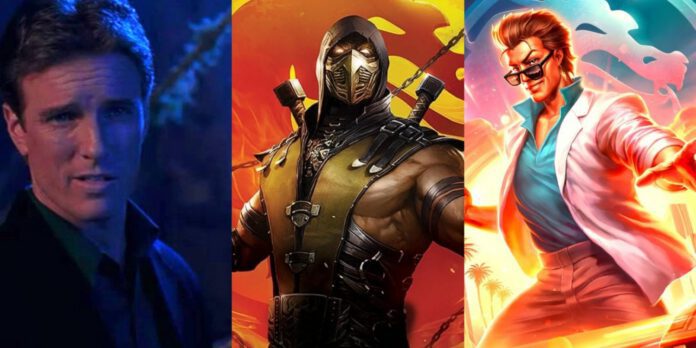The Mortal Kombat series remains one of the greatest fighting game franchises of all time. From its iconic roster of characters to its ever-evolving storylines, Mortal Kombat has stayed true to its core formula: intense combat, brutal fatalities, and over-the-top gore, elements that have only gotten better with each new generation of gaming hardware and software. For over 30 years, MK has carved out a lasting legacy in the gaming world.
But Mortal Kombat isn’t just a video game powerhouse; it’s also spawned a lineup of movies that range from cult classics to, well, less-than-stellar experiments. Whether it’s delivering fan-favorite characters or diving into wild and unexpected story arcs, each film has left its mark. So, let’s dive in and rank every Mortal Kombat movie released so far.
Table of Contents
Mortal Kombat: Annihilation (1997)
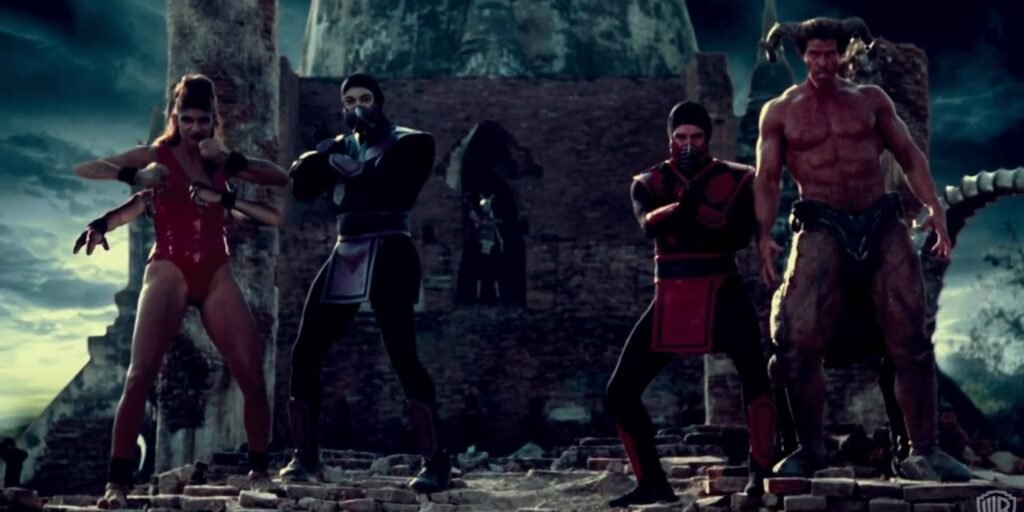
Mortal Kombat: Annihilation (1997), directed by John R. Leonetti, picks up immediately after the events of the 1995 film, with Outworld’s emperor Shao Kahn (Brian Thompson) breaking the rules of Mortal Kombat to invade Earthrealm. The plot follows returning heroes Liu Kang (Robin Shou) and Kitana (Talisa Soto), alongside new characters like Jax (Lynn “Red” Williams) and Nightwolf (Litefoot), as they race to stop Kahn and his minions from merging the realms within six days.
The film attempts to introduce a broader scope of Mortal Kombat characters and lore, including fan favorites like Sub-Zero, Scorpion, and Cyrax, but it suffers from a chaotic narrative, underdeveloped characters, and heavy reliance on poor CGI and green screen effects, even for the late ’90s.
The performances in Annihilation were generally panned, partly due to recasting several major roles, most notably Raiden, now played by James Remar, whose portrayal lacked the charisma of Christopher Lambert. Robin Shou was one of the few returning cast members, again delivering solid martial arts work despite a weaker script. Many of the new additions were underused or awkwardly inserted into the plot with little development.
Critically, the film was a failure, often cited as one of the worst video game adaptations of its time. Its commercial and critical flop effectively stalled the Mortal Kombat film franchise for over two decades, until the 2021 reboot revived interest with a darker tone, better production values, and a more faithful representation of the game’s violent roots. Annihilation is often viewed as a cautionary tale of sequel overreach and rushed production in video game cinema.
Related: Mortal Kombat (2011) – aka: ‘MK9’
Mortal Kombat: The Journey Begins (1995)
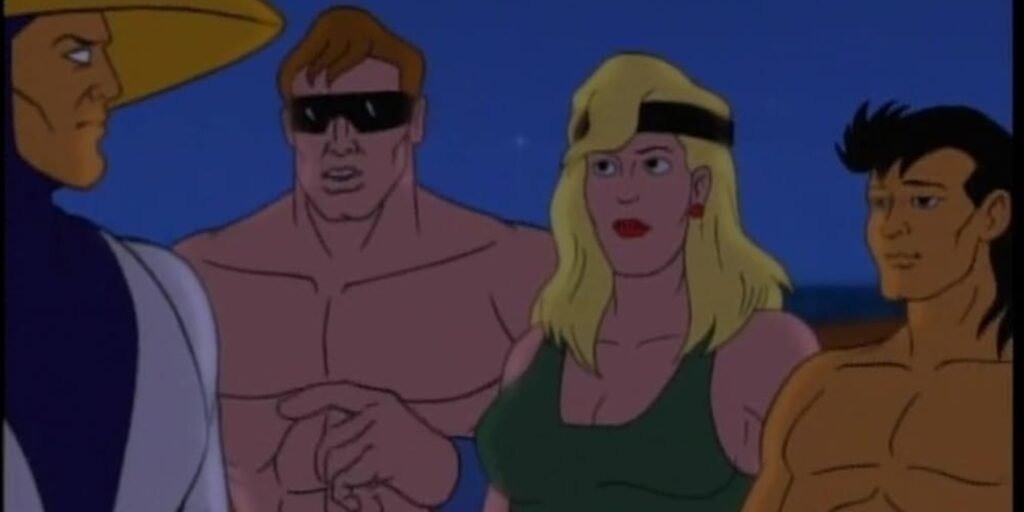
Mortal Kombat: The Journey Begins (1995) is an animated tie-in prequel to the 1995 live-action Mortal Kombat film. Intended to build hype and provide backstory, the 54-minute feature blends traditional animation with early CGI (which was poorly received even at the time). The narrative follows Liu Kang, Sonya Blade, and Johnny Cage as they travel to Shang Tsung’s island, with Raiden guiding them through flashbacks that explain the history of Mortal Kombat, the origins of Goro, Sub-Zero, Scorpion, and the tournament itself. While it attempts to enrich the lore, the storytelling is clunky and often feels more like an exposition dump than a cohesive narrative.
The voice acting is flat, with characters sounding either overly dramatic or completely disengaged. The animation is notably low-budget, particularly the jarring 3D fight scenes that fail to integrate with the 2D art.
While The Journey Begins was meant to attract younger fans and serve as an accessible intro to the Mortal Kombat mythos, it ultimately comes off as a rushed promotional piece rather than a standalone story. Despite its shortcomings, it holds a certain nostalgic charm for diehard fans and remains a curious relic of 1990s franchise marketing. Its failure, however, highlighted the challenge of adapting Mortal Kombat’s complex lore outside of games and helped future adaptations (like Mortal Kombat Legends) understand the need for higher production value and better storytelling.
Mortal Kombat (2021)
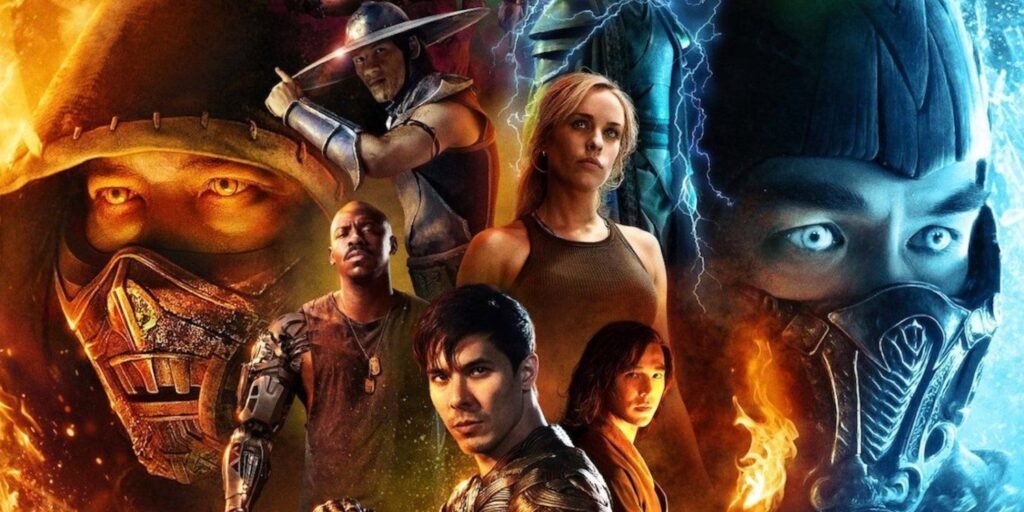
Mortal Kombat (2021), directed by Simon McQuoid, serves as a reboot of the franchise, aiming for a darker, more grounded take while staying true to the brutal spirit of the games. The story follows Cole Young (Lewis Tan), a new character created for the film, who discovers his mysterious birthmark is a symbol tied to an ancient tournament.
As he’s hunted by Outworld’s champion Sub-Zero (Joe Taslim), Cole joins forces with classic characters like Sonya Blade (Jessica McNamee), Jax (Mehcad Brooks), and Kano (Josh Lawson) under the guidance of Lord Raiden (Tadanobu Asano) and Liu Kang (Ludi Lin). Rather than depict the actual Mortal Kombat tournament, the film sets up the stakes leading to it, focusing on the training and assembling of Earthrealm’s fighters. This approach split audiences; some appreciated the world-building, while others were frustrated by the lack of an actual tournament.
Performance-wise, the film received praise for Joe Taslim’s chilling and physical portrayal of Sub-Zero and Hiroyuki Sanada’s honorable take on Scorpion, especially during the intense opening scene set in feudal Japan. Josh Lawson stole scenes as the crass, hilarious Kano, often cited as the film’s breakout star. Lewis Tan’s Cole Young was met with mixed reception, as some felt his character was too bland to anchor the story.
Visually, the film leaned heavily into gore and special effects, with fatalities recreated in visceral detail that appealed to longtime fans. While Mortal Kombat (2021) received mixed reviews overall, it was considered a step in the right direction for video game adaptations. Its moderate success on streaming and in theaters during the pandemic era paved the way for a confirmed sequel and reignited interest in the franchise’s cinematic future.
Read also: Flawed Masterpieces in Gaming
Mortal Kombat Legends: Battle of the Realms (2021)
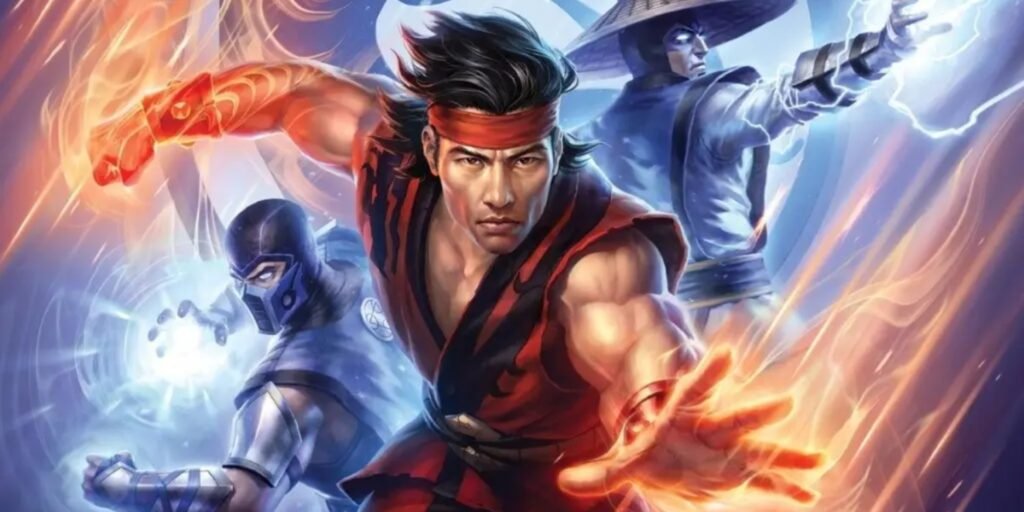
Mortal Kombat Legends: Battle of the Realms (2021), the direct sequel to Scorpion’s Revenge, continues the animated Mortal Kombat Legends series with an ambitious but overstuffed narrative. Directed again by Ethan Spaulding, the film tries to cover a wide swath of Mortal Kombat lore, including the final Mortal Kombat tournament, Liu Kang’s destiny as Earthrealm’s champion, the origin of the Kamidogu, and even Scorpion’s ongoing conflict with the Lin Kuei. While it delivers on fast-paced action and brutal fatalities, its attempt to juggle so many plotlines in a 77-minute runtime results in a rushed, uneven experience that lacks the focused storytelling of its predecessor.
Despite the narrative sprawl, the voice shines. Joel McHale once again steals scenes as the quippy Johnny Cage, while Patrick Seitz delivers emotional weight as Scorpion, though his storyline feels sidelined. Matthew Mercer replaces Jordan Rodrigues as Liu Kang and brings solid gravitas to the role, especially as Liu steps into the spotlight as Earthrealm’s chosen savior.
The animation is slick and impressively choreographed, showcasing intense one-on-one battles and large-scale brawls. However, Battle of the Realms received mixed reactions: fans appreciated the action and lore depth, but critics and viewers alike felt it crammed too much mythology into too short a runtime. While it expands the animated universe, it lacks the tight narrative and emotional punch that made Scorpion’s Revenge such a standout, serving more as a fan-service-heavy spectacle than a cohesive story.
Mortal Kombat Legends: Snow Blind (2022)
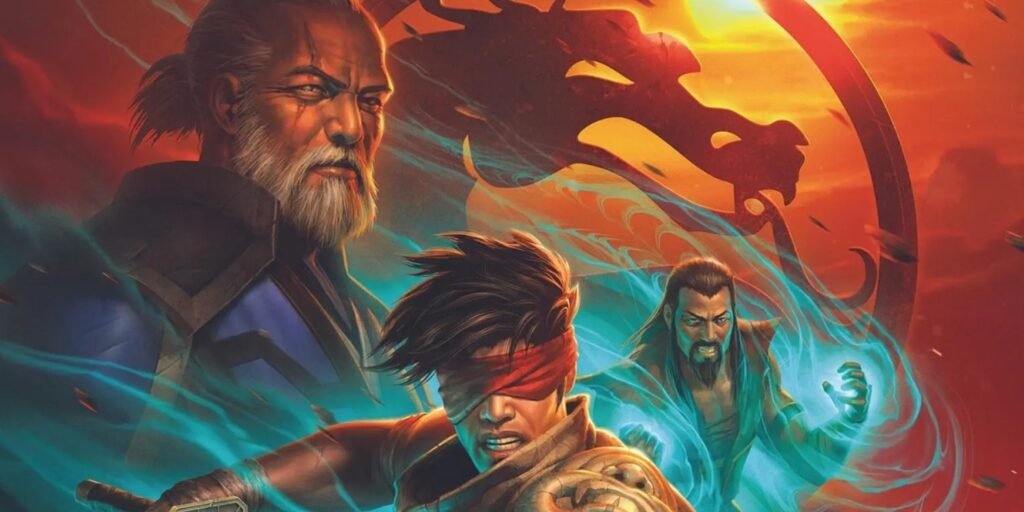
Mortal Kombat Legends: Snow Blind (2022) takes a bold narrative detour from the traditional tournament structure, delivering a post-apocalyptic, cyberpunk-infused story centered around a hardened, older Kenshi Takahashi. Directed by Rick Morales, the film is set in a desolate future where Earthrealm lies in ruins, and Kano, now a cyber-enhanced warlord, rules much of it through his Black Dragon clan. Kenshi, a cocky but untrained swordsman, is blinded in an early confrontation but later gains mystical abilities with the help of an aging, reclusive Kuai Liang (formerly Sub-Zero), who reluctantly trains him. The film explores themes of loss, mentorship, legacy, and redemption, with a character-driven story that feels refreshingly self-contained.
Voice performances are strong across the board. Manny Jacinto (Kenshi) brings energy and vulnerability to the role, while David Wenham (Kano) delivers a delightfully over-the-top villainous performance that balances menace with charisma. Ron Yuan’s Kuai Liang is quiet but powerful, conveying the weight of a warrior trying to escape a violent past.
The animation continues the Legends series’ tradition of stylized violence and fluid fight choreography, with intense, gory action sequences that highlight the physicality of each character. While Snow Blind doesn’t feature the wide roster of iconic fighters like other entries, its tighter focus and unique tone earned praise from fans who welcomed a fresh, more emotional take on the Mortal Kombat universe. It also hinted at deeper lore connections, particularly involving Kronika and the manipulation of time, setting up even larger stakes for future Legends installments.
Read also: Best Selling Gaming Consoles of all Time
Mortal Kombat Legends: Cage Match (2023)
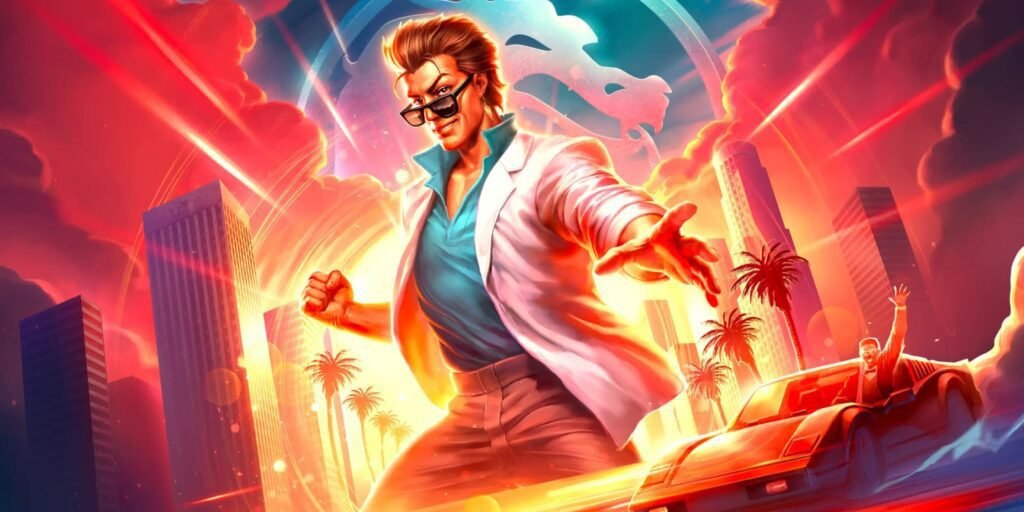
Mortal Kombat Legends: Cage Match (2023) is a wildly different entry in the Legends animated series, leaning fully into 1980s action-comedy and self-aware satire. Directed by Ethan Spaulding, this installment centers entirely on Johnny Cage, voiced once again by Joel McHale, who embraces the role with full-throttle charisma. Set in a neon-soaked, retro Hollywood setting, the story follows Cage as he battles ninjas, cults, and demons in an over-the-top mission to rescue a fellow actress, while slowly realizing the supernatural threats are all too real. Unlike the previous, darker entries, Cage Match is essentially a love letter to cheesy action flicks, blending Mortal Kombat’s brutality with campy humor and one-liners.
McHale’s Johnny Cage carries the entire film with comedic bravado, delivering a performance that’s both ridiculous and strangely sincere. The animation retains the series’ signature style but shifts toward more vibrant colors and exaggerated fight choreography to match the film’s tone. While still filled with gore and action, the violence is presented with a wink, never taking itself too seriously.
Reactions were mixed—some longtime fans appreciated the fresh, comedic tone and tighter focus on a single character, while others missed the ensemble storytelling and myth-building of earlier Legends films. Ultimately, Cage Match stands out as the most stylistically daring and tonally unique entry in the series, showing the franchise’s willingness to experiment beyond the tournament structure while giving Johnny Cage his long-overdue spotlight.
Mortal Kombat Legends: Scorpion’s Revenge (2020)
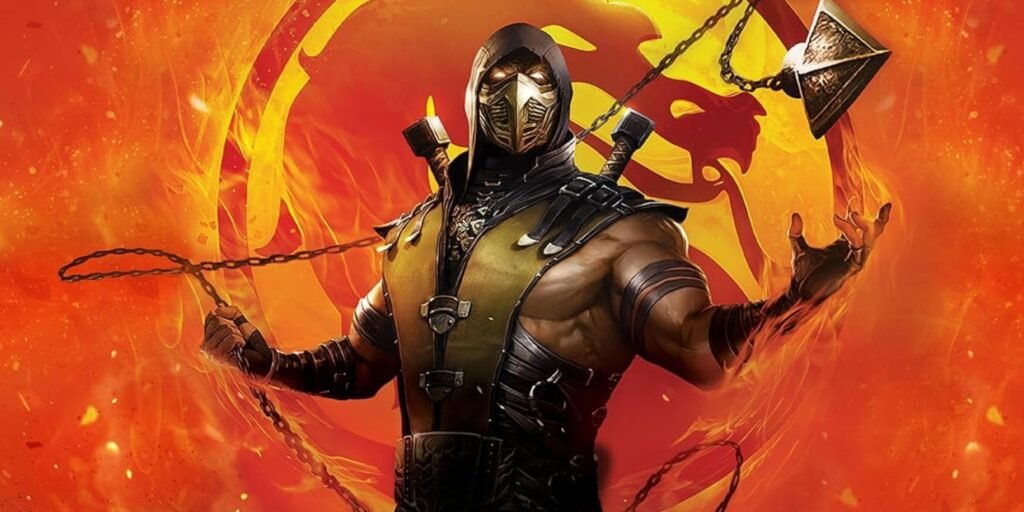
Mortal Kombat Legends: Scorpion’s Revenge (2020), directed by Ethan Spaulding and produced by Warner Bros. Animation, is a bold, ultra-violent animated reboot that reimagines the franchise’s origins with a focus on the tragic story of Hanzo Hasashi, a.k.a. Scorpion. The film opens with a brutal massacre of Hanzo’s family and clan at the hands of Sub-Zero and the Lin Kuei, setting him on a vengeful path that leads to his resurrection by the sorcerer Quan Chi.
While Scorpion’s revenge arc is the emotional core, the film also follows the classic Mortal Kombat tournament structure, with Liu Kang, Sonya Blade, and Johnny Cage representing Earthrealm under Raiden’s guidance. The dual narrative blends well, balancing character-driven drama with tournament action and fan-service moments.
Voice performances are a highlight; Patrick Seitz brings intensity and anguish to Scorpion, while Joel McHale’s Johnny Cage delivers comedic relief with perfect timing. Jennifer Carpenter (Sonya) and Jordan Rodrigues (Liu Kang) provide solid support, and Steve Blum’s portrayal of Sub-Zero and Quan Chi adds villainous weight. The animation is crisp and fluid, with beautifully choreographed fight scenes that lean heavily into the franchise’s signature gore. Scorpion’s Revenge was widely praised by both fans and critics for its mature tone, faithfulness to the source material, and strong storytelling. Its success revitalized Mortal Kombat in the animated realm and launched the Mortal Kombat Legends series, positioning it as one of the best adaptations the franchise has ever received.
Mortal Kombat (1995)
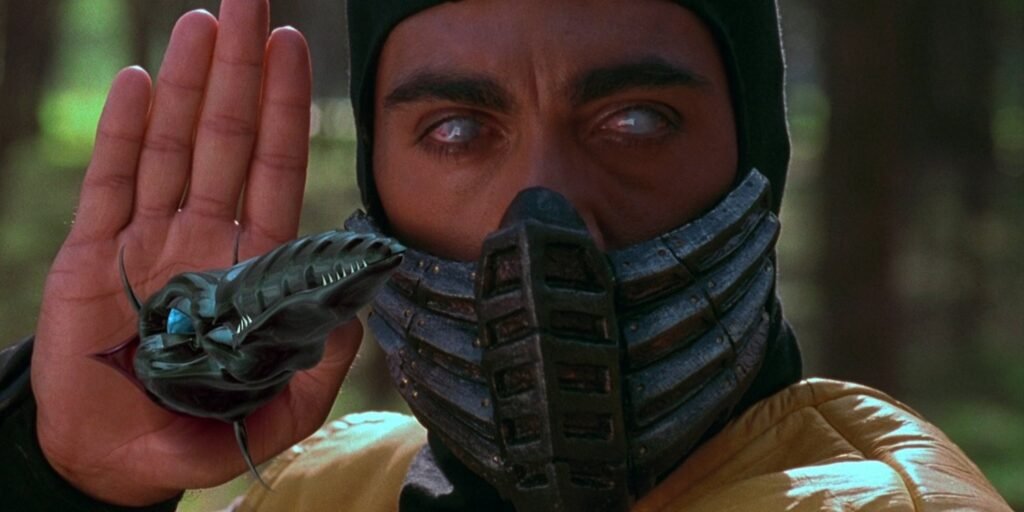
Mortal Kombat (1995), directed by Paul W.S. Anderson, is the first attempt at a live-action adaptation of the already popular video game franchise. The storyline follows Earthrealm warriors Liu Kang (Robin Shou), Sonya Blade (Bridgette Wilson), and Johnny Cage (Linden Ashby) as they are recruited by the thunder god Raiden (Christopher Lambert) to participate in the deadly interdimensional tournament.
Their goal is to defeat the forces of Outworld, led by the sorcerer Shang Tsung (Cary-Hiroyuki Tagawa), and prevent the Earth from being conquered. The plot is simple, yet it effectively captures the essence of the game, combining mystical lore, intense combat sequences, and stylized characters. Notably, Cary-Hiroyuki Tagawa’s portrayal of Shang Tsung stood out for its theatrical menace and iconic delivery of the line, “Your soul is mine.”
The performances in Mortal Kombat were a mix of camp and charisma, which contributed to the film’s lasting charm. While the acting wasn’t critically acclaimed, the cast embraced the source material with enthusiasm. Robin Shou brought depth to Liu Kang with genuine martial arts prowess and a sense of honor. Linden Ashby’s sarcastic take on Johnny Cage added levity, and Bridgette Wilson delivered a no-nonsense portrayal of Sonya, despite limited choreography time due to a last-minute casting. The film’s PG-13 rating meant it lacked the extreme gore of the games, but its stylistic visuals and energetic fight scenes resonated with fans.
Critically mixed but commercially successful, the 1995 film laid the groundwork for Mortal Kombat’s cinematic future, setting a tone that influenced sequels, animated adaptations, and the 2021 reboot, which built on its lore while reintroducing the franchise with a modern, bloodier edge. This first attempt still holds decades later as one of the best MK movies so far.

